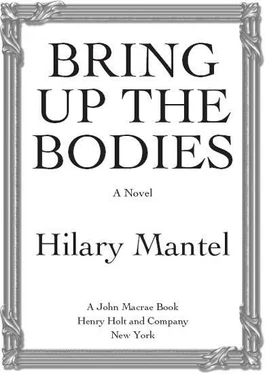Hilary Mantel - Wolf Hall - Bring Up the Bodies
Здесь есть возможность читать онлайн «Hilary Mantel - Wolf Hall - Bring Up the Bodies» — ознакомительный отрывок электронной книги совершенно бесплатно, а после прочтения отрывка купить полную версию. В некоторых случаях можно слушать аудио, скачать через торрент в формате fb2 и присутствует краткое содержание. Жанр: Старинная литература, на английском языке. Описание произведения, (предисловие) а так же отзывы посетителей доступны на портале библиотеки ЛибКат.
- Название:Wolf Hall: Bring Up the Bodies
- Автор:
- Жанр:
- Год:неизвестен
- ISBN:нет данных
- Рейтинг книги:5 / 5. Голосов: 1
-
Избранное:Добавить в избранное
- Отзывы:
-
Ваша оценка:
- 100
- 1
- 2
- 3
- 4
- 5
Wolf Hall: Bring Up the Bodies: краткое содержание, описание и аннотация
Предлагаем к чтению аннотацию, описание, краткое содержание или предисловие (зависит от того, что написал сам автор книги «Wolf Hall: Bring Up the Bodies»). Если вы не нашли необходимую информацию о книге — напишите в комментариях, мы постараемся отыскать её.
Wolf Hall: Bring Up the Bodies — читать онлайн ознакомительный отрывок
Ниже представлен текст книги, разбитый по страницам. Система сохранения места последней прочитанной страницы, позволяет с удобством читать онлайн бесплатно книгу «Wolf Hall: Bring Up the Bodies», без необходимости каждый раз заново искать на чём Вы остановились. Поставьте закладку, и сможете в любой момент перейти на страницу, на которой закончили чтение.
Интервал:
Закладка:
‘Can you say the Pater Noster?’ he asks.
‘Pater Noster,’ says the boy. ‘Or, Our Father.’
‘In Welsh?’
‘No, sir. There are no prayers in Welsh.’
‘Dear Jesus. I’ll get a man on it.’
‘Do, sir. Then I can pray for my father and mother.’
‘Do you know John ap Rice? He was at supper with us tonight.’
‘Married to your niece Johane, sir?’
The boy darts off. Little legs at work again. It’s his aim that all the Welsh will speak English, but that can’t be yet, and meanwhile they need God on their side. Brigands cover the whole principality, and bribe and threaten their way out of gaol; pirates savage the coasts. Those gentlemen with territory there, like Norris and Brereton of the king’s privy chamber, seem resistant to his interest. They put their own dealings before the king’s peace. They do not care to have their activities overseen. They do not care for justice: whereas he means to make an equal justice, from Essex to Anglesey, Cornwall to the Scots border.
Rice brings in with him a little velvet box, which he puts down on the desk: ‘Present. You have to guess.’
He rattles it. Something like grains. His finger explores fragments, scaly, grey. Rice has been surveying abbeys for him. ‘It wouldn’t be St Apollonia’s teeth?’
‘Guess again.’
‘Is it teeth from the comb of Mary Magdalene?’
Rice relents. ‘St Edmund’s nail parings.’
‘Ah. Tip them in with the rest. The man must have had five hundred fingers.’
In the year 1257, an elephant died in the Tower menagerie and was buried in a pit near the chapel. But the following year he was dug up and his remains sent to Westminster Abbey. Now, what did they want at Westminster Abbey, with the remains of an elephant? If not to carve a ton of relics out of him, and make his animal bones into the bones of saints?
According to the custodians of holy relics, part of the power of these artefacts is that they are able to multiply. Bone, wood and stone have, like animals, the ability to breed, yet keep their intact nature; the offspring are in no wise inferior to the originals. So the crown of thorns blossoms. The cross of Christ puts out buds; it flourishes, like a living tree. Christ’s seamless coat weaves copies of itself. Nails give birth to nails.
John ap Rice says, ‘Reason cannot win against these people. You try to open their eyes. But ranged against you are statues of the virgin that weep tears of blood.’
‘And they say I play tricks!’ He broods. ‘John, you must sit down and write. Your compatriots must have prayers.’
‘They must have a Bible, sir, in their own tongue.’
‘Let me first get the king’s assured blessing for the English to have it.’ It is his daily, covert crusade: for Henry to sponsor a great Bible, put it in every church. He is very close now and he thinks he can win Henry to it. His ideal would be a single country, single coinage, just one method of weighing and measuring, and above all one language that everybody owns. You don’t have to go to Wales to be misunderstood. There are parts of this realm not fifty miles from London, where if you ask them to cook you a herring they give you a blank look instead. Only when you’ve pointed to the pan and impersonated a fish do they say, ah, now I see what you mean.
But his greatest ambition for England is this: the prince and his commonwealth should be in accord. He doesn’t want the kingdom to be run like Walter’s house in Putney, with fighting all the time and the sound of banging and shrieking day and night. He wants it to be a household where everybody knows what they have to do, and feels safe doing it. He says to Rice, ‘Stephen Gardiner says I should write a book. What do you think? Perhaps I might if one day I retire. Till then, why should I give my secrets away?’
He remembers reading Machiavelli’s book, shut up in the dark days after his wife’s death: that book which now begins to make such a stir in the world, though it is more talked about than actually read. He had been confined to the house, he, Rafe, the immediate household, so as not to take fever into the city; turning the book over, he had said, you cannot really pluck out lessons from Italian principalities and apply them to Wales and the northern border. We don’t work the same way. The book seemed almost trite to him, nothing in it but abstractions – virtue, terror – and small particular instances of base conduct or flawed calculation. Perhaps he could improve on it, but he has no time; all he can do, when business is so pressing, is to toss phrases to clerks, poised with their pens for his dictation: ‘ I heartily commend me to you…your assured friend, your loving friend, your friend Thomas Cromwell. ’ No fee attaches to the post of Secretary. The scope of the job is ill-defined and this suits him; whereas the Lord Chancellor has his circumscribed role, Mr Secretary can inquire into any office of state or corner of government. He has letters from throughout the shires, asking him to arbitrate in land disputes or lend his name to some stranger’s cause. People he doesn’t know send him tittle-tattle about their neighbours, monks send accounts of disloyal words spoken by their superiors, priests sift for him the utterances of their bishops. The affairs of the whole realm are whispered in his ear, and so plural are his offices under the Crown that the great business of England, parchment and roll awaiting stamp and signet, is pushed or pulled across his desk, to himself or from himself. His petitioners send him malmsey and muscatel, geldings, game and gold; gifts and grants and warrants, lucky charms and spells. They want favours and they expect to pay for them. This has been going on since first he came into the king’s favour. He is rich.
And naturally, envy follows. His enemies dig out what they can, about his early life. ‘So, I went down to Putney,’ Gardiner had said. ‘Or, to be accurate, I sent a man. They said down there, who’d have thought that Put-an-edge-on-it would have risen so high? We all thought he’d be hanged by now.’
His father would sharpen knives; people would hale him in the street: Tom, can you take this, ask your father can he do aught with it? And he’d scoop it up, whatever blunt instrument: leave it with me, he’ll put an edge on it.
‘It’s a skill,’ he told Gardiner. ‘Honing a blade.’
‘You’ve killed men. I know it.’
‘Not in this jurisdiction.’
‘Abroad doesn’t count?’
‘No court in Europe would convict a man who struck in self-defence.’
‘But do you ask yourself why people want to kill you?’
He had laughed. ‘Why, Stephen – much in this life is a mystery but that is no mystery at all. I was always first up in the morning. I was always the last man standing. I was always in the money. I always got the girl. Show me a heap, and I’m on top of it.’
‘Or a whore,’ Stephen murmured.
‘You were young once. Have you been to the king with your findings?’
‘He should know what kind of man he employs.’ But then, Gardiner had broken off; he, Cromwell, approached him smiling. ‘Do your worst, Stephen. Put your men on the road. Lay out money. Search Europe. You will not hear of any talent I possess, that England cannot use.’ He had eased from within his coat an imaginary knife; he pressed it home, softly, easily, under Gardiner’s ribs. ‘Stephen, have I not begged you often and often to reconcile with me? And have you not refused?’
Credit to Gardiner, he didn’t flinch. Only with a kind of creeping of his flesh, and a pull on his robe, eased himself away from the airy blade. ‘The lad you knifed in Putney died,’ he said. ‘You did well to run, Cromwell. His family had a noose for you. Your father bought them off.’
Читать дальшеИнтервал:
Закладка:
Похожие книги на «Wolf Hall: Bring Up the Bodies»
Представляем Вашему вниманию похожие книги на «Wolf Hall: Bring Up the Bodies» списком для выбора. Мы отобрали схожую по названию и смыслу литературу в надежде предоставить читателям больше вариантов отыскать новые, интересные, ещё непрочитанные произведения.
Обсуждение, отзывы о книге «Wolf Hall: Bring Up the Bodies» и просто собственные мнения читателей. Оставьте ваши комментарии, напишите, что Вы думаете о произведении, его смысле или главных героях. Укажите что конкретно понравилось, а что нет, и почему Вы так считаете.












